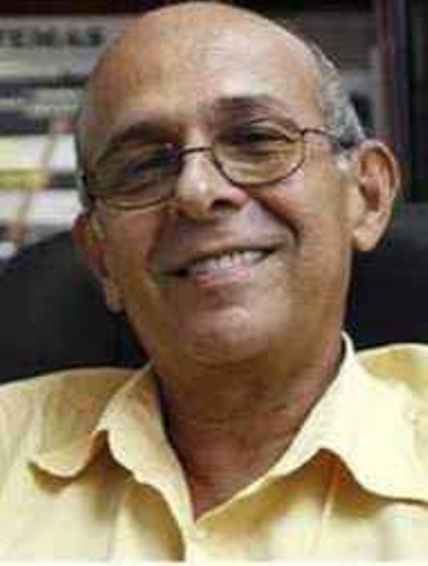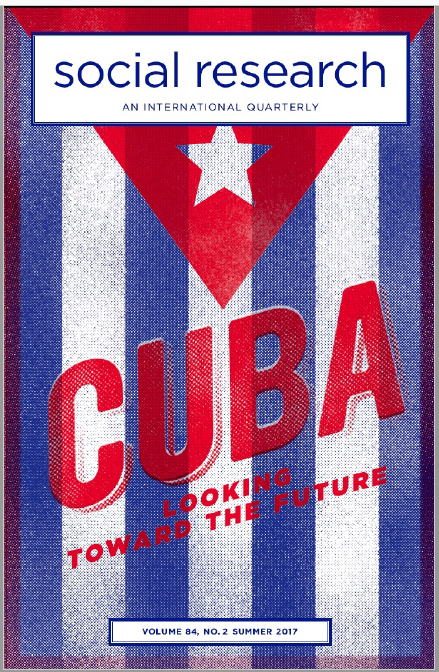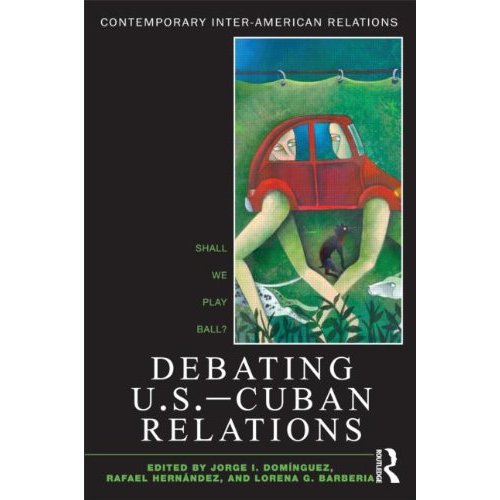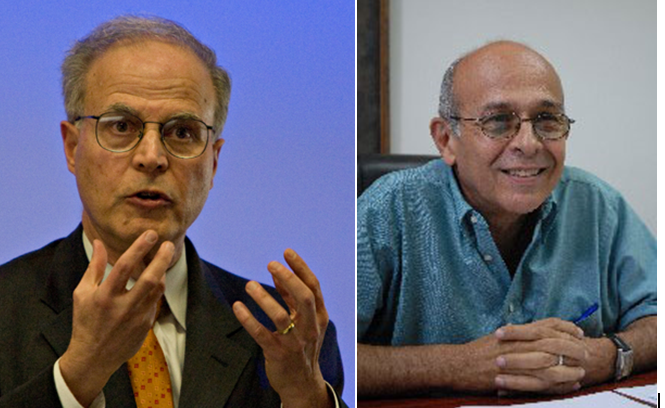By Rafael Hernandez
January 8, 2015
Original here: “No Es Facíl”
Cubans have become used to preparing for war with the United States, not for dialogue and negotiation. U.S. policy-makers have specialized in attacking the island, which has kept them from learning to understand it. Neither side has been trained to deal with an adversary rather than an enemy. Each side’s success in a scenario of rapprochement depends on its ability to acquire such knowledge and turn it into real policy.
What does the United States have to gain in negotiations with Cuba? It hopes to moderate future Cuban actions, increase its ability to influence Cuban politics, and obtain benefits from specific areas of bilateral activity by doing the following:
1. Responding to a constituency of interest groups (agribusiness, biomedical, tourism, maritime transportation, health care, higher education, sports, entertainment, and perhaps oil) and freeing South Florida Cuban-American people and businesses, hostages of established policies, to organize in favor of tighter ties;
2. Paving the way for the 5,911 U.S. companies that were nationalized in 1960 to negotiate some kind of compensation under Cuban law (as Spanish, Canadian, French, Swiss, and other foreign firms did long ago);
3. Removing a point of contention with Latin America and U.S. allies that rejected the Helms–Burton Act on free-trade grounds, and easing the bilateral tension within international organizations like the U.N. Human Rights Commission;
4. Improving the flow of information between the two countries via legitimate exchange of radio and TV programs between public institutions, a fiber-optic cable connection, and improved mail, telephone, and Internet service;
5. Consolidating migration agreements (signed in 1994 and 1995); and
6. Reaching formal agreements to back ongoing cooperation in drug traffic interception, naval and air security, military and coast guard coordination, environmental protection, and other areas.
U.S. recognition of the socialist government favors Cuba’s independence and self-determination. For Cuba, dialogue with the United States could lead to additional benefits:
1. Lessening the cost of security and defense and the burden on economic development imposed by hostility and a multilateral embargo that affects Cuba’s relations with the rest of the world;
2. Gaining access to U.S. markets and capital flows, with a multiplier effect on all of Cuba’s foreign relations;
3. Forming alliances with various sectors of U.S. society;
4. Facilitating cooperation in areas related to geographic contiguity, like transportation and other trade-related issues, and environmental concerns, such as ocean pollution in the Florida Straits and protection of migratory species; and
5. Pursuing the return of the Guantánamo naval base territory to actual Cuban sovereign control. same Cuban regime that has been called illegitimate for half a century), and instate reciprocal agreements in place of unilateralism.
But there are also costs: The United States has to confront long-established resistance within the permanent bureaucracy and the Cuban-American right wing, admit that its Cuban policy has failed (and offer de jure recognition to the same Cuban regime that has been called illegitimate for half a century), and instate reciprocal agreements in place of unilateralism.
Although many Cubans favor détente and appreciate its economic benefits, they also remain worried about U.S. political and ideological intentions. In his recent statement on the new Cuban policy (Dec. 17), U.S. President Barack Obama stressed that U.S. policy will continue to focus “on issues related to democracy and human rights in Cuba … and promote our values through engagement.”
U.S.-style democracy and capitalist values are framed as a “peaceful evolution” strategy when applied to other cases (China, Vietnam) – another version of the old “regime change” policy.
Some Cubans are concerned about the effects of this policy, because it aims to undermine the socialist consensus among some groups in a period of changes during which social and political cohesion are of strategic value. U.S. government agencies and die-hard anti-communist groups in Miami, as well as their representatives in Congress, could use this opportunity to find new ways to fund political opposition, sending anti-government propaganda and trying to influence the Cuban domestic context.
The Cuban government finds itself in an unprecedented situation. It must choose between playing defensively and developing a new proactive strategy. Its ability to build up alliances and consensus will be decisive.
The identities of U.S. allies in Latin America, Europe, and Cuba are quite obvious. So, too, are the identities of Cuban allies, including many Latin American and Caribbean governments, emerging powers like Brazil, Russia, India, China, and South Africa (BRICS), and some paradoxical ones, such as U.S. corporations, the U.S. Coast Guard, the U.S. Drug Enforcement Administration, the U.S Citizenship and Immigration Services, and the silent majority of the Cuban-American people.
The main weakness Cuba needs to overcome is not its lesser physical power, but its siege mentality. The United States, on the other hand, needs to overcome its sense of superpower arrogance vis-à-vis a small neighbor. Most counterproductive policies on both sides, from the U.S. Bay of Pigs fiasco to Cuba’s Internet restrictions, have been the consequence of these weaknesses.
As long as bilateral rapprochement moves forward, new issues could appear on the table. Cuba has only two foreign policy principles for negotiating differences, particularly with big powers like Europe and the United States: no preconditions and no double standards.
Cuba must figure out how to keep domestic political affairs within the area of dialogue and exchange rather than negotiation. Structural transformation in the Cuban economic and political system, individual liberties (particularly expression, movement, and association), the role of the mass media, and other issues related to citizens’ rights are internal affairs. To subject them to the dynamic of bilateral agreements with the United States could be politically counterproductive in terms of Cuban public opinion, even in the eyes of Cubans pushing for such changes. It would be like subordinating the patterns of life within a family to agreements with the upstairs neighbor.
Members of Cuban civil society, including rank and file party members, agree that dialogue with the United States may depressurize the domestic atmosphere and facilitate change, encourage generational turnover in the leadership, lead to a more decentralized system, and contribute to empowering the most constructive elements of both cultures and peoples.
Those who are in favor of a reformed Cuban socialism, not a Caribbean capitalism, support a détente with the United States that may help dissipate the siege mentality and lead to a political environment that facilitates a more democratic model.
Cuban socialists aspire to a kind of democracy that is defined by more than just a commitment to periodic elections within a highly regulated multiparty system. The Cuban public debate points toward radical democratization of the society and system as a whole – not just the polity, but also the community, schools, workplaces, economic management, and social and political organizations, including the Cuban Communist Party.
For the Cuban government, the issue will no longer be how to keep the ideological enemy from penetrating, because in a sense it is already inside. Instead, the government must be concerned with how to reshape and promote the domestic consensus, reactivate a socialist political culture on a new basis, and get rid of old rituals that have lost their meaning.
A new Cuba–U.S. relationship could certainly improve relations between Cuban-Americans and their counterparts on the island. Would the Cuban-American elite keep paying its dues to the declining industry of anti-Castroism as real business between the two shores prospers? Would its members hold on to their identities as ideologues rather than businesspersons, or would they opt to behave like other historical overseas economic elites (Vietnamese, Chinese)?
Finally, to what degree can those hostile networks withstand the emergence of economic and strategic interests that would broaden the surface of contact between the two sides? If this new correlation of forces emerges, classical torpedoes launched by hostile networks to destabilize the process of rapprochement will be less likely to succeed.
The conflict has already entered a transition phase. As often occurs between human beings, when favorable circumstances arise, a first step can unleash a march that exceeds all expectations. As President Obama said in his statement (adopting a Cuban expression made popular by Kermit the Frog), “no es fácil” – “it is not easy.” Although the process will be complicated, the most costly point for a U.S. president is now past: The ice has been broken.
 Rafael Hernandez
Rafael Hernandez












